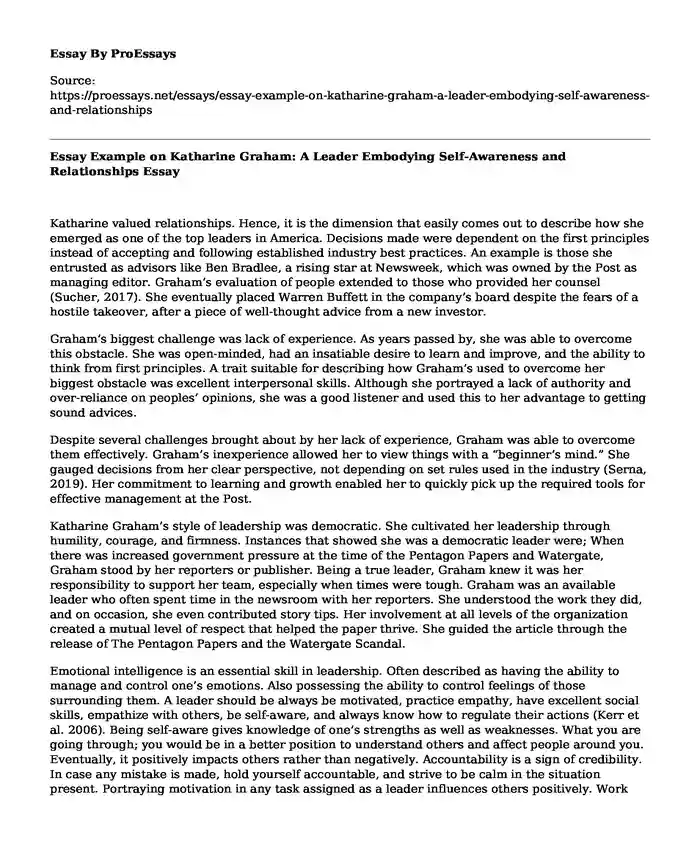Katharine valued relationships. Hence, it is the dimension that easily comes out to describe how she emerged as one of the top leaders in America. Decisions made were dependent on the first principles instead of accepting and following established industry best practices. An example is those she entrusted as advisors like Ben Bradlee, a rising star at Newsweek, which was owned by the Post as managing editor. Graham’s evaluation of people extended to those who provided her counsel (Sucher, 2017). She eventually placed Warren Buffett in the company’s board despite the fears of a hostile takeover, after a piece of well-thought advice from a new investor.
Graham’s biggest challenge was lack of experience. As years passed by, she was able to overcome this obstacle. She was open-minded, had an insatiable desire to learn and improve, and the ability to think from first principles. A trait suitable for describing how Graham’s used to overcome her biggest obstacle was excellent interpersonal skills. Although she portrayed a lack of authority and over-reliance on peoples’ opinions, she was a good listener and used this to her advantage to getting sound advices.
Despite several challenges brought about by her lack of experience, Graham was able to overcome them effectively. Graham’s inexperience allowed her to view things with a “beginner’s mind.” She gauged decisions from her clear perspective, not depending on set rules used in the industry (Serna, 2019). Her commitment to learning and growth enabled her to quickly pick up the required tools for effective management at the Post.
Katharine Graham’s style of leadership was democratic. She cultivated her leadership through humility, courage, and firmness. Instances that showed she was a democratic leader were; When there was increased government pressure at the time of the Pentagon Papers and Watergate, Graham stood by her reporters or publisher. Being a true leader, Graham knew it was her responsibility to support her team, especially when times were tough. Graham was an available leader who often spent time in the newsroom with her reporters. She understood the work they did, and on occasion, she even contributed story tips. Her involvement at all levels of the organization created a mutual level of respect that helped the paper thrive. She guided the article through the release of The Pentagon Papers and the Watergate Scandal.
Emotional intelligence is an essential skill in leadership. Often described as having the ability to manage and control one’s emotions. Also possessing the ability to control feelings of those surrounding them. A leader should be always be motivated, practice empathy, have excellent social skills, empathize with others, be self-aware, and always know how to regulate their actions (Kerr et al. 2006). Being self-aware gives knowledge of one’s strengths as well as weaknesses. What you are going through; you would be in a better position to understand others and affect people around you. Eventually, it positively impacts others rather than negatively. Accountability is a sign of credibility. In case any mistake is made, hold yourself accountable, and strive to be calm in the situation present. Portraying motivation in any task assigned as a leader influences others positively. Work towards attaining the goals you have set. Give a helping hand to your employees on the job to be done. Always lead by example. Find a positive outcome in every challenge faced. At times try fitting yourself in other’s shoes and think about the case. It is called empathy. To be a successful leader, one should practice compassion to earn respect from others. The end goal for social skills is to communicating your point of view. Building rapport with others helps make the relationship more comfortable.
Setting the tone for your organization can be challenging at times. Delivering and setting the tone is very crucial to creating a positive culture of your organization. As a leader of an organization, your team looks at you for cues in handling a situation they found themselves. A leader should always lead by example (Sucher, 2017). A well communicated and emphasized positive culture within an organization or team lasts long, even with a change in leadership. Setting the right tone and staying focused on maintaining it over time always contributes to leadership efforts having a long-lasting impact.
Conclusion
As a leader, it is vital to exercise sound leadership skills. These leadership skills are crucial in the success of an individual, those around them as well as their organization. In leadership roles, it is impossible not to contribute to the culture within the organizations we serve. Always place the needs of others before yours, connect to their emotions, and still be available whenever they need you. Katharine’s mode of leadership inspires one to lead in a firm way why maintaining compassion and towards others.
References
Gerber, R. (2005). Katharine Graham: The Leadership Journey of an American Icon. Portfolio (Hardcover).
Kerr, R., Garvin, J., Heaton, N., & Boyle, E. (2006). Emotional intelligence and leadership effectiveness. Leadership and Organization Development Journal, 27(4), 265-279. https://manajemenrumahsakit.net/wp-content/uploads/2012/09/EI-leadership-effectiveness.pdf
Serna, Matt. 2019. Transforming Obstacles into Opportunities. The Startup. https://medium.com/swlh/transforming-obstacles-into-opportunities-207fbf4a7793
Sucher, S. J. (2017). Teaching the moral leader: A literature-based leadership course: A guide for instructors. Routledge.
Cite this page
Essay Example on Katharine Graham: A Leader Embodying Self-Awareness and Relationships. (2023, Sep 10). Retrieved from https://proessays.net/essays/essay-example-on-katharine-graham-a-leader-embodying-self-awareness-and-relationships
If you are the original author of this essay and no longer wish to have it published on the ProEssays website, please click below to request its removal:
- ERP and SCM Software Essay
- Adolescent Suicidal Behaviors Paper Example
- Essay Sample on Parents' Responsibilities & Children's Rights Under Family Law Act
- Essay Sample on The Power of Music: Enhancing Brain Development
- Essay Example on Slave Trade & Slavery in US: A Historical Perspective
- Essay Example on Early Dynastic Period: 2900-2350 BCE - A Cultural & Political Transformation
- Essay Sample on East-West Cultural Divides: A Study







